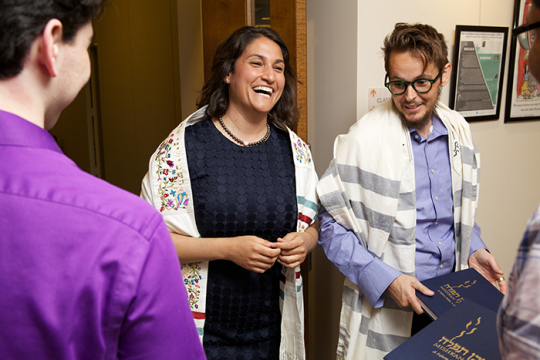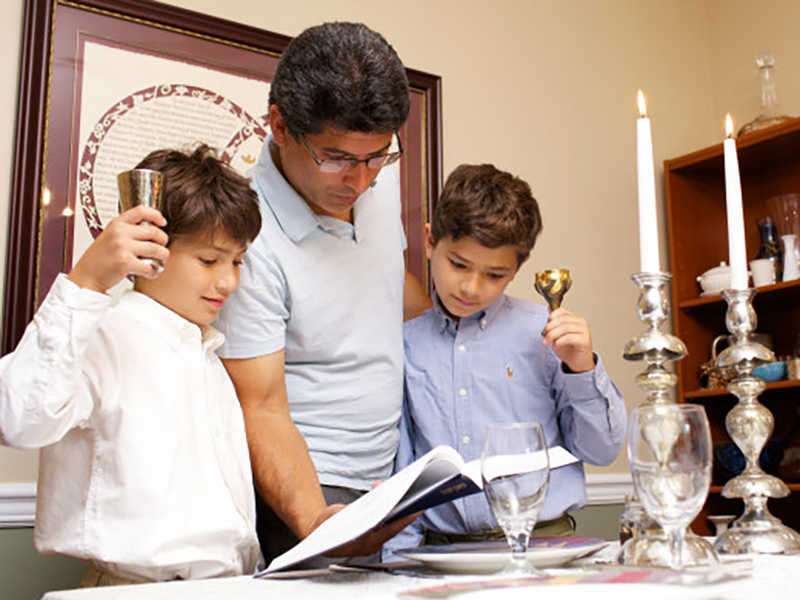
While I pray that the coronavirus pandemic will pass over quickly, that turnaround is unlikely to happen by Passover. With the holiday just weeks away – so soon that Manischewitz and Streit’s products are already in markets – now is the time to make backup plans for our seders.
The seder that I am privileged to attend, one of the highlights of the year, is no ordinary in-home event.
Started by seven sisters and brothers in 1950s Los Angeles, the Figoten family seder has since expanded like a boiling matzah ball. In recent years, relatives have traveled for hours on the SoCal freeways, flown in from the East Coast, and occasionally dropped in from New Zealand.
The guest list has grown to include friends who are grafted to the family tree by whichever Figoten descendant initially invited them. Of the 30 to 40 attendees, no one has the last name Figoten anymore, and a sizable number are not related at all. Yet we are a Passover family.
Every Passover, Jews recite that this night is different from all other nights – but no Passover in recent memory threatens to be as different as this one.
Though some small seders may proceed more or less normally, a large seder with elderly relatives, out-of-towners, or others in vulnerable groups will surely require considerable adjustments. I have always believed in the maxim that there’s no substitute for being there in person, but this season, prudence demands some creative alternatives.
So let’s set the table:
1. As this modern-day plague reaches biblical proportions, a virtual seder has its virtues.
Just as congregations, schools, and offices assemble online, we can celebrate via videoconference.
Skype, Zoom, Google Hangouts, and other apps can enable people to share the holiday safely and meaningfully – and many of these wondrous tools are free, like manna from heaven.
2. Keeping the hardcopies in storage, we can send out online Haggadot in advance.
This year, as we take turns reading around the high-tech table, seder leaders will most assuredly direct participants to briefly step away from their screens to perform urchatz, the handwashing ritual that is presently having its 15 seconds of fame.
3. So many seder tables are beautified by sentimental crafts, and we need not leave those behind.
For the Figoten family seder, for example, we will email the guests photos of their special place cards, exquisitely handcrafted so long ago by our beloved matriarch Aunt Dorothy and replicated by later generations.
4. We can of course still sing “Dayenu” and other favorite tunes together.
While there are many Passover songs to consider, at our seder no song is more venerated than cousin Amy’s “Ballad of the Figoten Clan.”
5. To conclude the seder, we can hide the afikoman digitally.
Whether that takes the form of an internet wordsearch or a Where’s Waldo?-style picture or a Wikipedia hunt, it will be a snap to Venmo the prize to the finder.
6. After the prescribed order, we will leave folks to enjoy their meals.
For anyone not used to preparing this elaborate dinner, we can send a helpful grocery list with matzah, maror, macaroons, and more the week prior. And we can toss in some of our favorite Pesadik recipes for those who want to try their hands during quarantine at homemade gefilte fish and horseradish from scratch.
7. No seder is complete without honoring the holiday’s essential command: “Let all who are hungry come and eat.”
We will encourage everyone to donate to organizations that are doing this vital and lifesaving work amid crisis – only a dipped fingertip away. Consider your local food bank and Mazon, A Jewish Response to Hunger.
When Moses bid Pharaoh to “let my people go,” it was with “a strong hand and an outstretched arm” that the Lord led the Hebrews out of bondage – the foundational miracle of our faith, the Exodus with a capital E.
We have a miracle in our own time too: the miracle of technology. So this year, if need be, we can spatially distance and socially undistance our treasured annual gathering.
May it be God’s will that science leads us to the promised land posthaste and that contingency plans like this one become unnecessary. But if we cannot chat in the same room this year, may this chatroom Passover not be so different from all other Passovers.
Chag not-quite-the-same-ach. Next year in Jerusalem…or at least in person.
Planning your own virtual seder this year? This list of curated digital content will help you host the ultimate online gathering.
Related Posts

9 Jewish Activities to Try When You’re at Home with Kids

Measuring Demons in the Wake of the Pandemic

